- Home
- George Zebrowski
Stranger Suns Page 4
Stranger Suns Read online
Page 4
“Wait,” Malachi said.
“Magnus, what do you think?” Juan asked. “Should we avoid these doors?”
“I don't know.”
“How do you feel?” Lena asked.
“I don't feel any ill effects.”
Lena stepped forward. The oval indentation glowed red and she went through. Juan followed her—
—into darkness.
They stood at what seemed to be the edge of a cliff. The Earth appeared at their feet. Antarctica was a darkening mass surrounded by water. Mount Erebus, the lights of Base One in Taylor Valley, and the Transantarctic Range were all clearly visible. The tips of Africa and South America were juttings of green and brown, still catching the sunlight.
The Earth grew smaller.
“We're in a ship!” Lena exclaimed.
Malachi said, “There's no sense of inertia or acceleration, so we must be inside a very advanced drive-field.”
Driveandfield, Juan thought excitedly as he watched the Earth recede. To see it diminish so quickly was a shock.
“I still hear that sound,” Lena said.
Juan became aware of it—a distant, almost musical call. The Earth shrank by half.
“We're accelerating at a fantastic rate,” Magnus said with dismay.
“What sort of vessel needs this kind of speed?” Juan asked, resentful that it should exist at all.
“The sound,” Malachi said. “Perhaps it's a summons for the crew. I feel like a canoe builder inside an ocean liner.”
“Are we that backward?” Lena asked.
“We have some idea of our position,” Malachi replied.
Lena said, “This vessel was in the ice a long time. The crew might be asleep. If their physics is any clue to their biological science, suspended animation wouldn't be too difficult.”
“But what was it doing on Earth?” Magnus asked.
“We can't rule out that it belongs to one of our past civilizations,” Juan said, feeling some comfort in the thought, because it would mean that humanity would not have to measure itself by the accomplishments of others. How many civilizations might have lived and died in Earth's geologic past? How many varieties of intelligence might have existed? As he looked across the widening gulf, Earth became a green star with a speck of quicksilver for a moon. He felt lost.
“If this is an alien ship,” Lena said, “then we're not alone in the galaxy.”
The Sun flooded the chamber with light. They looked away, but the intensity dropped to a bearable brightness.
“I wonder where it's taking us,” Lena said.
The electric glare of the growing Sun was hypnotic. “At this pace,” Malachi said, “we'll pass it in a matter of hours. This seems to be a viewing area for the crew. Let's go below. The chamber I showed you before may be a kind of chart room. We might learn where we're going.”
Juan waited as the others went through the glow, then followed them—
—out into the passage.
They all looked at him, and at each other, suddenly fearful.
As they retrieved their packs at the drop tube and continued down the spiral passage, Juan knew that they were all thinking the same thing. These supplies would not last long, and there was no telling how long the voyage would last.
* * *
One by one, they went through the dissolving door into the drum-shaped chamber, and settled themselves in the circle at the center of the amber floor. The grade around the flat area reminded Juan of an amphitheater without seats.
Magnus stepped into the center, triggering the starfields. He stepped back and the warm, indirect yellow glow came on again. He paced back and forth in front of his pack.
“I wonder how far we've come,” Lena said as she unrolled her sleeping bag.
Juan sat down on his pack. “We'll have to explore the ship.”
Malachi sat up on his bedding and looked at him. “You believe we can get back, old man?”
Juan looked at Lena. Magnus stopped pacing. “It's best we face up to it right away,” Juan said. “We may never see home again.”
“We'll get back,” Lena said softly, unable to disguise the doubt in her voice. “It might take a while, but we'll just have to learn how to run this ship.”
“It seems to be automatic,” Malachi replied. “No evidence of controls anywhere.”
“We haven't really looked,” she said, checking the supplies in her pack. “We won't starve for a while, anyway.”
“Well, what do we know?” Magnus asked. “We're on a ship. We know how to activate this map chamber, if that's what it is. We think we saw our departure from Earth. And we've had some strange experiences in a few chambers. I got stuck in a door. I've also observed, judging by the lock and doors, that it doesn't take much knowledge to use things in this ship. A little trial and error goes a long way. I don't think we'll find equipment we can tinker with.”
“There's another thing to consider,” Juan said, “and that's whether this is a relativistic sublight ship or a more advanced type. If it's a relativistic ship, then our biological clocks will run slow, and even if we do get back, it'll be to a future Earth.”
“We may lose everything we know,” Lena added softly.
Except one another, Juan thought. Malachi had been his closest friend in recent years. They had lost track of their earlier acquaintances from school and early work years. They had both always been exiles—Mal from his childhood homeland, Juan from the community and family that had found his work puzzling or pointless. He wondered what Lena and Magnus stood to lose.
Lena had spread all the items from her pack on the floor. “Perhaps we won't return too far in the future,” she said, sitting back on her heels. “Even a century might make for a better Earth.” Her gaze seemed contemplative rather than lost, and Juan realized that she might be as much a loner as he was.
“Displacement in time will be a problem,” Magnus said, “only if the vessel stays at some significant fraction of light speed for a while. But it's possible that acceleration may be only preliminary to the ship switching over to some more efficient mode of interstellar passage. Just a thought.”
“Here's what we have in each pack,” Lena said.
Juan saw that there were two quarts of water, candy bars, coffee, packets of fish, rice, and vegetables, oatmeal, dried milk, and apricot bars, as well as matches, chewing gum, soap, vitamins, antitooth-decay powder, a small mirror, knife and fork, comb, flares, flashlight, a collapsible spade, small notebook and pen, an automatic, and a first-aid kit. They were wearing thermal underwear, shirts, sweaters, pants, boots, and fur-lined parkas with face masks.
A sad look came into Lena's face as she looked at the supplies. “The edibles,” she said, “might last us for two, maybe three weeks if we're careful, but the water won't. We'll have to drink as little as possible. Thirst will get us before starvation.” Her mouth tightened a little. “It doesn't appear likely that there's food and water in this ship, but we should look around while we have our strength.”
Malachi laughed.
“What's so funny?” she asked.
“The idea of starving in the midst of all this high tech.” He reached into his pocket and took out a crumpled pack of cigarettes. “Five left. Wish I'd brought more.”
Lena wrinkled her nose in disapproval. “They'll make you more thirsty.”
“After we get some sleep,” Juan said, “we'll explore the ship thoroughly. Maybe we'll arrive at some place where there's food and water.”
Magnus scratched the stubble on his head. “A very brave man once said that you're not dead til you're dead.”
As he lay down to rest, Juan thought of the bones in the white chamber.
6. STARCROSSERS
The child of the starcrossers awoke. It surged into the ship's subsystems—adjusted power inputs and outputs, traced information links and sensors back to its core—and waited for a directive. Starcrossers had not joined with it for over 500,000 orbits of this planet's primary. Sustain
ing energy continued to flow from the web, but no directives.
The starcrossers now present would give it a new task to perform.
But they did not join with it.
Reaching out, it searched for a directive in them, and found only what seemed to be questions.
It reached deeply into the resources of its core to decode these impulses, and failed. Something was wrong with the starcrossers. They could not join with it.
Only routines were left to be obeyed.
::Break icelock. Proceed to nearest suncore station::
* * *
Juan dreamed of an ancient Earth, where his boyhood castle still stood on the rocky, oceanless California shore. A feeble sun smouldered over the dry Pacific bed. Hot winds stirred the red dust as great crab-things crawled between the black cracks.
The stone shelves of his castle still held his childhood books on astronomy and biology. A box cradled the bones of Phaeton, his cat, whom he had dug up to see if living creatures decomposed after they stopped breathing. There was a picture of his father, who had died mocking his son's profession as a peculiar hobby. “A grown man has better things to do!” his voice echoed through the castle. His mother would have accepted anything her son chose to do, but she had never really understood his work. She still lived, but was aging even more quickly as the ship's velocity increased. A century might pass on Earth before he awoke. . .
Wind blew the stones of his castle away, exposing him to the red glare. He broke out of the dream, opening his eyes to the yellow-amber glow of the alien chamber. Anxious, he lay still, unable to see beyond himself, searching for the strength to accept that he was imprisoned within an alien artifact that was carrying him across vast distances, away from home. Terrible beauties played in his child's brain as he mourned the loss of amniotic intimacies. His fatalism was a dark useless thing that he kept on a leash. It would serve him best at his death, when it would make it easy for him to let go.
* * *
Magnus stepped into the center of the circle and the chamber darkened. The three-dimensional field again showed stars.
“They're red-shifted,” Malachi said, “so that's the region we're leaving.”
Magnus pointed. “That star still shows a disk. It's got to be our sun.”
“How far away are we?” Lena asked.
Juan said, “We're at some significant fraction of light speed, and probably still accelerating. If the stars redden and drop from sight into the infrared, we'll know that we're really moving.”
“That will happen at about one-third light speed,” Malachi said.
“Does that mean this is a relativistic ship?” Lena asked.
“It is so far,” Malachi replied. “Only great speed can do what we're seeing. In a relativistic ship the universe will blacken fore and aft as the light's stretched and compressed beyond the capacity of our eyes to register the wavelengths. In the view we're seeing, the light is chasing us and the waves are getting longer as we accelerate.”
Juan's stomach tightened. “If this is only a relativistic ship,” he said to Lena, “then it will reach some large fraction of light speed and arrive at its destination, covering a vast distance in a shorter ship-time, while a longer time passes on Earth. At over ninety percent of light speed, it might cover vast distances in what will be very short ship-time, while life back home hurtles into futurity.”
“So we may be on a one-way trip,” she said.
He nodded. “Unless we learn to operate the ship, and turn it around. If it does attain near-light speed and stays there for a while, we'll be thrown centuries beyond our time.”
Lena took a deep breath and sat down on her sleeping bag. “That's a lot to face.”
“But better than not coming back at all,” Malachi said softly. “It might be very interesting.”
“Right now,” Magnus said, “we have no reason to think the ship is anything but relativistic.” He sat down cross-legged in the center circle.
Juan glanced up at the fading stars and sat down. “We're on a mad ride into darkness with thirst and starvation at the end. We'll be dying in a month's time.”
“That's all right, dear fellow,” Malachi said. “We'll carve you up. I'd say you were good for a month's feed.”
“Very funny.”
Magnus said, “I think there's hope.”
“There must be something we can do,” Lena added.
Juan said, “Go on, Magnus.”
“I'm wondering what powers this ship—if it's carrying the enormous amount of fuel it would take to move it up to even this velocity, or getting power in some other way. What we've observed doesn't fit in with a purely sublight propulsion technology. For one thing, we don't feel acceleration, yet it must be considerable, which indicates control of inertia and gravitation.”
“You mean antigravity?” Lena asked.
“Yes, or some way by which the ship's apparent mass and inertia are reduced, maybe even to zero, in relation to the rest of the universe. Such a ship might achieve unlimited speeds. I credit the builders with knowing why material bodies, as we know them, can't be boosted faster than light.”
Juan lay down and put his hands behind his head. “It may still be only a relativistic ship, but with some kind of field-effect propulsion system.”
“You may be right,” Magnus continued, “but I suspect there's more.”
Malachi said, “We're provincials, trying to understand what is before us according to what may be inapplicable constraints. A great civilization stands behind this ship. Relativistic star travel might be expected at the beginnings of a starcrossing culture, but the temporal dislocations, even for adventurous types, would be very inconvenient.”
“Not if they're very patient and long-lived,” Juan said. “Maybe they use suspended animation to pass the time. Relativistic star travel may be the only kind that's possible, shortsighted as that may seem.”
“Let's hope you're wrong,” Magnus replied, “because a fast system may be our only way of returning to our own time, if we get back at all.”
“He's right,” Malachi cut in. “A first-class interstellar empire has to get around.”
“Look!” Lena shouted.
Stars were blue-shifting, their center darkening toward ultraviolet.
“That has to be the forward view,” Malachi said.
There was a flash of blue light and the configuration of stars changed. These were also blue-shifted, but without a blackening center.
“What's happening?” Lena asked.
As they watched, the central area of stars began to fade again. The view switched with another burst of blue light. Yellow stars appeared.
“I think we've made two jumps,” Magnus said, “and we're decelerating.”
* * *
The child of the starcrossers rolled away from the planet, following the curve of local space as it set coordinates for the next suncore, in a triple star system only two jumps away.
But the third sun was missing when it regained three-space curvature. There would be no renewal here. With only two jumps left in drive potential, it reached out to link with the nearest power core.
* * *
The yellow stars brightened as the ship slowed.
“So it's not a relativistic ship,” Lena said. “That gives us a chance of getting home, doesn't it?”
“If we can master its controls,” Magnus replied.
“Juan, what do you think?” she asked.
“Magnus seems to have been right so far,” he said, admitting to himself that he had underestimated the man.
A double star lay directly ahead. The perception of depth was overpowering as Juan's eyes caught the difference between the farther stars and this nearby binary. Both suns were yellow-white, slightly flattened disks, orbiting close enough to each other to be exchanging plasma along gravitomagnetic lines.
“We're the first human beings to reach another solar system,” Lena said with awe.
“This ship is just too automatic
,” Juan said, “which doesn't bode well for our taking control. It may not have any controls.”
“Let's see what we can learn,” Magnus said calmly.
The yellow-white suns filled the chamber with light. As the ship's position changed, the nearer sun began to eclipse the other.
Lena pointed. “Look, there!” A black spot crept across the face of the eclipsing sun.
“Maybe a planet,” Juan said, “or a black hole, showing up in one of the few ways it can be visible. We're at the wrong angle to see if it's swallowing material from its companions.”
What would he have felt, he asked himself, if someone had offered him this journey? He would have accepted with joy. Of course, he would have assumed that he would return. Now he found himself observing purely for what might be learned, with little thought of going home. He smiled to himself. Much of his adult life had been spent clearing away obstacles to his work. Finally, there was nothing to impede him. Three colleagues accompanied him on a journey that could only be described as a thought-experiment come to life. It might only last a few weeks at most, or for the rest of his life, but he would take advantage of every minute.
“Lena, is there a notebook in our packs?” he asked.
He saw her clearly in the bright light. She seemed heartened by his resolve.
“There's one in each pack.”
“We must keep notes,” he said. “They'll be valuable if we get back. Or someone may find them.” An image of four skeletons flashed through his mind, lying here as the ship fled across the universe, his own clutching a notebook.
Magnus stood up, pulled a ring from his right hand and dropped it at his feet. “Let's see if this will keep the view on, or if my whole body is required in the circle.” He stepped out of the center. The view remained.
Lena rose suddenly. “We're heading directly into those suns.”
Juan looked up at the eclipsing stars. They did seem larger, with the angle of view unchanged. The black spot was at the center of the visible disk, which now showed several dark umbral regions surrounded by gray penumbrals.
“Either it's a magnified view,” he said, “or we're close enough to see sunspots, and getting closer.” His stomach tightened. “If a fancy doorway could malfunction, then a deteriorating navigational program could run this ship into a star. We may have only a few minutes left.”

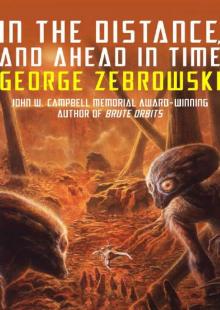 In the Distance, and Ahead in Time
In the Distance, and Ahead in Time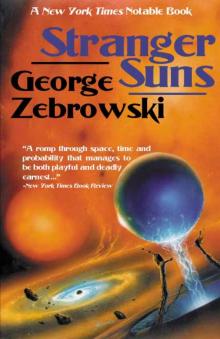 Stranger Suns
Stranger Suns Black Pockets
Black Pockets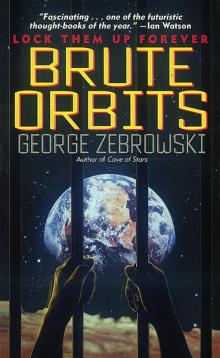 Brute Orbits
Brute Orbits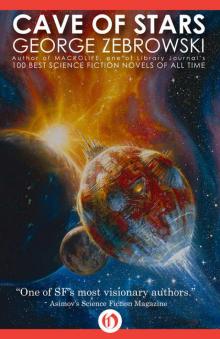 Cave of Stars (Macrolife Book 2)
Cave of Stars (Macrolife Book 2)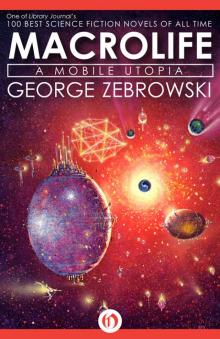 Macrolife
Macrolife Empties
Empties Heart Of The Sun Star Trek 83
Heart Of The Sun Star Trek 83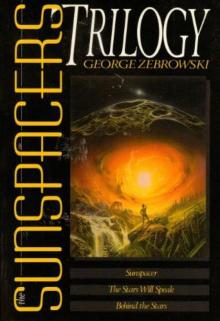 The Sunspacers Trilogy
The Sunspacers Trilogy